Beekeeping Basics For Beginners
92 Practical Tips To Guide The Novice Backyard Beekeeper
Andrew Michaels
Beekeeping Basics For Beginners: 92 Practical Tips To Guide The Novice Backyard Beekeeper
All Rights Reserved 2012 Andrew Michaels and www.92Tips.com
First Printing: 2012. Published by www.92Tips.comThe editorial arrangement, analysis, and professional commentary are subject to this copyright notice. No portion of this book may be copied, retransmitted, reposted, duplicated, or otherwise used without the express written approval of the author, except by reviewers who may quote brief excerpts in connection with a review. United States laws and regulations are public domain and not subject to copyright. Any unauthorized copying, reproduction, translation, or distribution of any part of this material without permission by the author is prohibited and against the law. Disclaimer and Terms of Use: No information contained in this book should be considered as financial, tax, or legal advice. Your reliance upon information and content obtained by you at or through this publication is solely at your own risk.The publisher and author assumes no liability or responsibility for damage or injury to you, other persons, or property arising from any use of any product, information, idea, or instruction contained in the content or services provided to you through this book. Reliance upon information contained in this material is solely at the reader's own risk. The authors may have a financial interest in or receive compensation from manufacturers of products or websites mentioned in this book.
Introduction
Hi. This is Andrew Michaels. Firstly, I want to thank you for investing in "Beekeeping Basics For Beginners: 92 Practical Tips To Guide The Novice Backyard Beekeeper". I hope that you find it both useful and interesting to read. I spent a long time collating as much information about beekeeping as I could, and made the effort to really break it down into what I believe are the most useful tips on the subject.I've also tried to make this ebook as readable as possible, and have purposely left out terms that may be too technical or 'wordy'. Hopefully, in my opinion, I've given you the most helpful tips I can about beekeeping without resorting to padding the text out like many books on the subject I've read!As I've tried to format this ebook version as closely to the paperback version as possible, for the best reading experience, please adjust your font size to the smallest setting (as shown below). Don't worry, you'll be able to easily read everything, it just means that each tip should fit on a seperate 'page' just like in the paperback.

Like with any topic, you may already be aware of some of the tips I share with you. However, just because you've heard them before, it doesn't mean that you apply them, does it?! So...I recommend that, apart from reading through this is ebook from virtual cover to cover, you regularly dip into it for inspiration, as that's the best way to truly get the most out of it!I hope you enjoy reading this ebook. It has taken me a while to research, write, edit, and publish it...and I apologize in advance if I have missed any grammatical errors or spelling mistakes!Take care,Andrew Michaels
Check to ensure that you're allowed to keep bees where you live.

Most places will allow you practice beekeeping and to manage a beehive, but it is always prudent to check. As honeybees are an essential part of the ecosystem, it is unusual for keeping bees to be prohibited, but there may be reasons why you aren't able to that aren't immediately obvious, so just double-check to be sure.
Only undertake beekeeping if you can really devote time to it.

Beekeeping isn't an easy pastime, and the management of your hive will take a lot of your attention on a regular basis. It is certainly a rewarding hobby, but it isn't something you should take on lightly unless you are really serious about the time and money you will need to invest in it.
Have yourself examined for allergies to bee stings before beekeeping.

In the event you feel discomfort the very first time that you receive a bee sting, it is okay. Having said that, should you get a hypersensitive reaction you might want to reevaluate your choice to get involved with beekeeping.
You need to be acquainted with a number of other items when you are beekeeping.

A few of these are your comb foundation roller, queen gate, hive tool, grafting needle set, queen excluder, bee veil, individual chamber beehive, knife for uncapping, brushes, sulfur dust, honey filter, hive stand, queen cage, honey extractor, protector for the queen cell, wax sheets, pollen traps, honey tray, frame gripper, formic acid, and wasp trap.
Dont buy used equipment if at all possible.

Although you might be tempted to buy used equipment, its a better idea to buy new equipment. The reason for this is because the used equipment might have problems that you might not have the ability to fix or to recognize.
If you have to buy used equipment, choose wisely.

If you decide to buy used equipment, its a good idea to have someone who is experienced in beekeeping look at the items that you are going to buy or that you have bought. Its also a good idea to have someone to be your mentor when you first start out.
Be ready for the bees.

Make sure that you have all of the required items before you purchase your bees. This way you will be sure that you are prepared. A good idea to find out what you need is to go online and find some websites to find out what should be ordered.
Start with some Italian bees.

Theyre the standard bees for the United States. Theyre commonly available, theyre known to those beekeepers you might ask for help, and easy for you to handle. You will have the best luck with these kinds of bees.
Order the bees in the beginning of the year.

You will find that ordering the bees in January or even February is the best time. If you wait to order the bees until March, you may find that there are no bees that you can buy. The other thing that might happen is that youre going to get the bees that they wont be able to harvest the nectar and pollen that they need to make it through the winter.

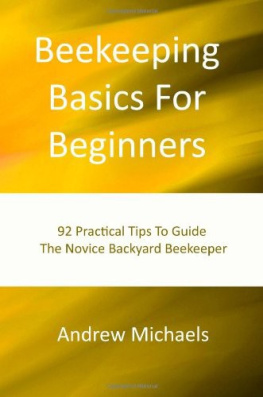
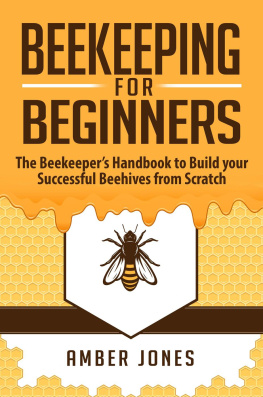

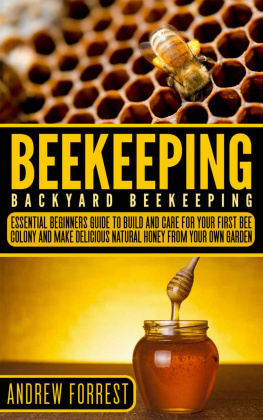
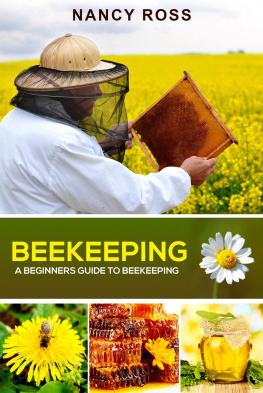
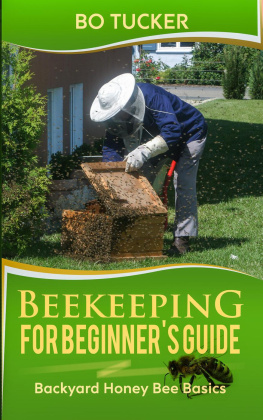
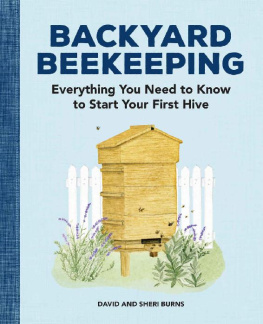
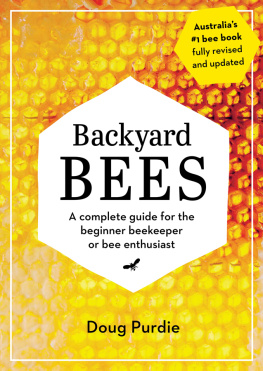
 Like with any topic, you may already be aware of some of the tips I share with you. However, just because you've heard them before, it doesn't mean that you apply them, does it?! So...I recommend that, apart from reading through this is ebook from virtual cover to cover, you regularly dip into it for inspiration, as that's the best way to truly get the most out of it!I hope you enjoy reading this ebook. It has taken me a while to research, write, edit, and publish it...and I apologize in advance if I have missed any grammatical errors or spelling mistakes!Take care,Andrew Michaels
Like with any topic, you may already be aware of some of the tips I share with you. However, just because you've heard them before, it doesn't mean that you apply them, does it?! So...I recommend that, apart from reading through this is ebook from virtual cover to cover, you regularly dip into it for inspiration, as that's the best way to truly get the most out of it!I hope you enjoy reading this ebook. It has taken me a while to research, write, edit, and publish it...and I apologize in advance if I have missed any grammatical errors or spelling mistakes!Take care,Andrew Michaels 







